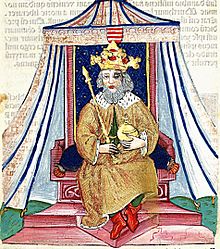Andrew I of Hungary
| Andrew I | |
|---|---|

Andrew I on the throne (Thuróczi's Chronicle)
|
|
| King of Hungary | |
| Reign | 1046 – 1060 |
| Coronation | 1046, Székesfehérvár |
| Predecessor | Peter |
| Successor | Béla I |
| Born | c. 1015 |
| Died | before 6 December 1060 (aged 44–45) Zirc, Kingdom of Hungary |
| Burial | Tihany Abbey |
| Spouse | Anastasia of Kiev |
| Issue |
Adelaide, Duchess of Bohemia Solomon, King of Hungary David George (illegitimate) |
| Dynasty | Árpád dynasty |
| Father | Vazul |
| Mother | a lady from the Clan Tátony |
| Religion | Christian |
Andrew I the White or the Catholic (Hungarian: I. Fehér or Katolikus András or Endre; c. 1015 – Zirc, before 6 December 1060) was King of Hungary from 1046 to 1060. He descended from a younger branch of the Árpád dynasty. After spending fifteen years in exile, he ascended the throne during an extensive revolt of the pagan Hungarians. He strengthened the position of Christianity in the Kingdom of Hungary and successfully defended its independence against the Holy Roman Empire.
His efforts to ensure the succession of his son, Solomon, resulted in the open revolt of his brother, Béla. Béla dethroned Andrew by force in 1060. Andrew suffered severe injuries during the fighting and died before his brother was crowned king.
Medieval sources provide two contradictory reports of the parents of Andrew, and his two brothers, Levente and Béla. For instance, the Chronicle of Zagreb and Saint Gerard's Life write that their father was Vazul, a grandson of Taksony, Grand Prince of the Hungarians (r. c. 955–c. 970). The Illuminated Chronicle and other medieval sources write of Vazul's relationship with "some girl" from the Tátony clan who bore his sons, who thus "were not born of a true marriage-bed". According to a concurrent tradition, which has been preserved by most chronicles, the three princes were the sons of Vazul's brother, Ladislas the Bald. Modern historians, who reject the latter report, agree that Andrew and his brothers were the sons of Vazul and his concubine from the Tátony clan. According to the historian Gyula Kristó, Andrew was the second among Vazul's three sons. He writes that Andrew was born around 1015.
...
Wikipedia
